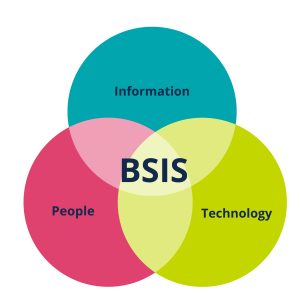B.S. in Information Science
Overview
 Information professionals design and develop systems and services to help people find information and create new knowledge in different settings.
Information professionals design and develop systems and services to help people find information and create new knowledge in different settings.
Students in the B.S. in Information Science program learn:
- The many ways in which information can be created, communicated, stored, and/or transformed in order to benefit individuals, organizations, and society.
- Practical skills for analyzing, processing, and managing information and developing and managing information systems.
- Problem-solving and decision-making skills to effectively utilize information tools and take leadership roles in our information economy.
- To evaluate the role of information for a variety of industries, organizational settings, populations, and purposes.
- The value of information and information tools, their current role in society and the economy, as well as their historical significance and potential impact on the future.
The field of information science is focused on the needs of people and organizations. This makes it different from fields like computer science, which are more focused on technology.
The B.S. in Information Science is designated as a STEM program, which allows eligible international graduates to apply for a 24-month OPT extension.
Is Information Science the Right Major for You?
The field of information science focuses on bringing together both people and technology to serve an organization. Professionals are willing to explore different topics and interests, understand ethical issues related to information, and work in team environments. IS professionals are boundary-spanners. They translate between technical and non-technical roles and adapt a human-centric approach to technology.
While the degree program does include a programming course in Python, most students don’t pursue careers in coding. Rather, they learn the mental model of computer science so that they are versed in that perspective. Students also develop professional skills that employers value, such as communication and teamwork.
One of the best ways to learn more about information science is by taking one of our introductory courses, such as INLS 161: Tools for Information Literacy. You’ll explore software use, computer applications, and networked information systems.
If you decide you want to major in information science, you’ll then complete a set of prerequisite courses and apply for admission. Criteria for acceptance include academic record, work and extra-curricular experience, and substantive thinking about the role of information in society. Our student services staff will be with you the whole way, making sure you’re on track to find a rewarding career!
Field Experience Program
Enter the workplace with confidence by completing a field experience! Students gain 135 hours of professional experience in an information organization while receiving three hours of class credit. A field experience can be completed during the fall, spring, or summer term. Students are mentored by both a supervising professional in the organization and a full-time SILS faculty member. The program is intended for students who are junior or senior status.
Careers in Information Science
Graduates of this program go to work for top companies, including Google, Credit Suisse, LinkedIn, Twitter, SAS, Atlantic BT, Nielsen-Norman, Red Hat, and Capital One, as well as government organizations and non-profits. Graduates assume a variety of job titles, including:
- Business Analyst
- Database Designer
- Information Security Specialist
- Software Engineer
- Systems Manager
- Technology Consultant
- UX (User Experience) Architect
- Web Developer
How to Apply
UNC students may apply to the information science major once they have completed all three prerequisite courses or have completed two and are currently enrolled in the third.
Students will then complete five core courses and five pre-approved electives.
Dual-Degree Program
Enroll in graduate-level coursework while pursuing the BSIS that will apply towards a Master of Science in either Information Science (MSIS) or Library Science (MSLS).
ADMISSIONS INFORMATION
 Questions?
Questions?
Contact Benjamin Levine
Assistant Director of Undergraduate Programs and Advising
bjlevine@unc.edu or 919-962-8366




